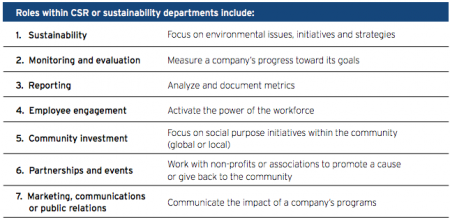10 Tips for a Career in Corporate Social Responsibility
A career in corporate social responsibility (CSR) is considered the holy grail for many professionals. Whether you are looking to switch into CSR or start your career it can be incredibly daunting (and competitive). How do you break into break into the limited number of CSR roles if you’re coming from nonprofit or have limited experience?
Good news is, this is a growing area of priority for companies, and it is possible with hard work, patience and tenacity. Here are 10 tips for a career in corporate social responsibility:
1. UNDERSTAND THE VARIETY.
CSR is an umbrella term that many companies use to describe a variety of activities. To some businesses, CSR can refer to their sustainability efforts (minimizing their environmental footprint), their investment in community initiatives, their employee volunteerism, or the management of their corporate foundations. You could also be consulting or advising corporations on their CSR efforts.

2. FOCUS ON YOUR SKILL SET.
Companies want to know what you can do for them, and how your unique skill set will be beneficial for the company. In CSR it’s about knowing how to communicate well and turn insights and research into compelling cases in presentations, writings and conversations. There always needs to be a business case for why things should be done, with small CSR budgets, it is important that you can be resourceful and connect the dots.
Key skills and competencies as identified by CSR professionals:
- Interpersonal: CSR leads are required to work across departments and are responsible for communicating and collaborating with others. CSR is not always in an established department, so you need to rely on your relationships to get things done. You have to be a visible leader and able to rally the troops.
- Communication: Knowing how to communicate well, both verbally and written is a critical must-have skill for a career in corporate social responsibility. You are responsible for communicating everything from the business case to your impact and need to be able to tailor the message to different audiences and stakeholders.
- Systems thinking and connecting the dots: CSR is a cross sectoral and often requires partnerships with other organizations. Being able to see the big picture and explain how your organization fits into the greater cause will be important.
- Business Acumen: Strategic thinking, sustainability, research, analytics, and marketing are some of the most common skill-sets looked for in a CSR role (dependant on the company).
3. FAMILIARIZE YOURSELF WITH THE LANGUAGE OF CSR.
If you’re looking to get a job in CSR it’s important you’re able to speak the language of sustainability. If you want to walk the walk, you need to talk the talk. As CSR can be a cross-sectoral field, it will become increasingly important to understand the terminology of business, non-profit, and public policy. Here’s our beginner’s guide to CSR language.
4. BUILD YOUR PERSONAL BRAND.
Let your online presence speak louder than the words on your resumé by showing, not just telling future employers what you’re expertise is in. Ensure your LinkedIn profile is up to date, and share your thoughts and knowledge. A well-crafted online presence can go a long way to differentiating you from your competition. Who knows—your future boss could be your latest Twitter follower or blog reader.
ps- Don’t wait until you’re job searching to do this!
5. TAKE ADVANTAGE OF NETWORKING EVENTS.
Don’t spend all your time perfecting your resumé and responding to job ads. Attend conferences and events to build your network and expand your connections in the sector. A large number of jobs are filled through connections and referrals, as people like to hire people they already know or have heard of.
6. TALK TO PEOPLE.
Talking to people who have the type of job you want or who are working for organizations you are interested in is one of the best ways to learn more about potential job opportunities. Before you start leveraging your network (or your contacts’ network) to set up informational interviews, take the time to ask yourself what you want. If you start meeting with people before you are ready, you risk making a poor first impression.
7. EMBRACE TWITTER.
Never has access to top industry experts been so available as many CSR leaders have twitter accounts. Follow these key hashtags: #CSR, #susty #ESG, #SRI, #CSRchat (a twitter chat about CSR), #sustainability
8. BE RESOURCEFUL.
Go above and beyond to learn about the industry you are interested in. Investigate the company you are targeting, uncover details and work hard to set yourself apart. Demonstrate that you took the time to get to know the topic you are heading into.
9. GET INTRAPRANEURIAL.
Not everyone can find their CSR job right away, but there’s ways to make any job more meaningful. Bring forward your favourite cause/charity, spearhead a volunteer program, help plan a sustainability program for your company or get your company B corp certified.
10. READ MORE.
Stay up to date with the latest issues and trends with these resources:
- Corporate Knights
- Stanford Social Innovation Review
- CSRwire
- Triple Pundit
- 3bl
- Aspen Institute
- Net Impact
- Boston College Centre for Corporate Citizenship
Are we missing any tips or resources? Let us know in the comments below. If you found this post helpful, please share it 🙂
For more insights- read the Impact Economy: The Insider’s Guide to Finding Meaningful Work and Attracting Top Talent
Want more curated content delivered straight to your inbox?
Follow us on twitter @b_meaningful and like us on Facebook







4 Comments
Great post! I encourage you to at the Boston College Center for Corporate Citizenship to your resource list.
http://ccc.bc.edu/index.cfm?fuseaction=Page.viewPage&pageID=4&userid=8221
Thanks Shane! We appreciate your suggestion and have included it in our list 🙂
more than awesome , I wish to enter these field 🙂 I like sustainability and all its related activities .
can you add which skills and related courses to make me ready for this position 🙂
are there any certifications or courses that can help a candidate stand out amongst their peers?